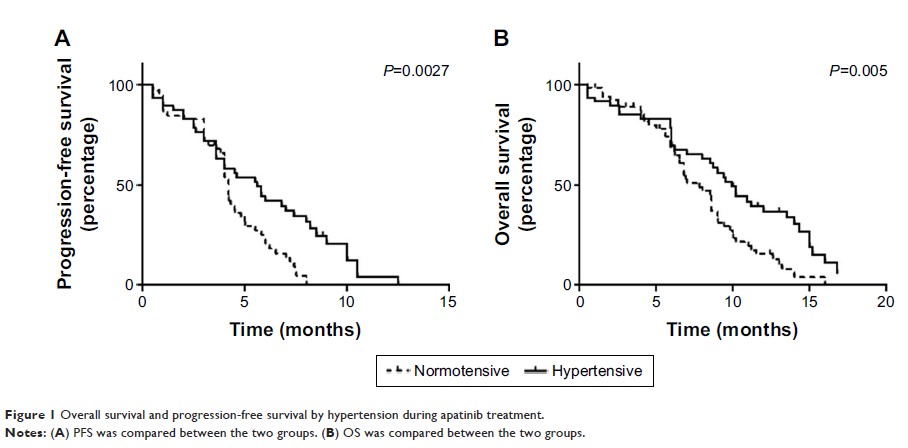108384
论文已发表
注册即可获取德孚的最新动态
IF 收录期刊
- 3.4 Breast Cancer (Dove Med Press)
- 3.2 Clin Epidemiol
- 2.6 Cancer Manag Res
- 2.9 Infect Drug Resist
- 3.7 Clin Interv Aging
- 5.1 Drug Des Dev Ther
- 3.1 Int J Chronic Obstr
- 6.6 Int J Nanomed
- 2.6 Int J Women's Health
- 2.9 Neuropsych Dis Treat
- 2.8 OncoTargets Ther
- 2.0 Patient Prefer Adher
- 2.2 Ther Clin Risk Manag
- 2.5 J Pain Res
- 3.0 Diabet Metab Synd Ob
- 3.2 Psychol Res Behav Ma
- 3.4 Nat Sci Sleep
- 1.8 Pharmgenomics Pers Med
- 2.0 Risk Manag Healthc Policy
- 4.1 J Inflamm Res
- 2.0 Int J Gen Med
- 3.4 J Hepatocell Carcinoma
- 3.0 J Asthma Allergy
- 2.2 Clin Cosmet Investig Dermatol
- 2.4 J Multidiscip Healthc

高血压是接受阿帕替尼治疗的晚期非小细胞肺癌患者的预测生物标志物
Authors Fang SC, Huang W, Zhang YM, Zhang HT, Xie WP
Received 7 October 2018
Accepted for publication 7 January 2019
Published 1 February 2019 Volume 2019:12 Pages 985—992
DOI https://doi.org/10.2147/OTT.S189984
Checked for plagiarism Yes
Review by Single-blind
Peer reviewers approved by Dr Amy Norman
Peer reviewer comments 2
Editor who approved publication: Dr William Cho
Background: Hypertension
(HTN) is a common adverse event of the vascular endothelial growth factor
pathway inhibitor apatinib. This study was conducted to evaluate the
association of apatinib-induced HTN with clinical outcomes in patients with
advanced non-small-cell lung cancer (NSCLC).
Methods: We
retrospectively analyzed 110 consecutive patients with advanced NSCLC who were
treated with apatinib from August 2014 to January 2018. All patients were
classified as normotensive or hypertensive based on blood pressure measurements
after initiating therapy. Therapeutic response, progression-free survival
(PFS), and overall survival (OS) were evaluated. Univariate and multivariate
analyses were performed using the Cox proportional hazards method.
Results: A total
of 46 patients (42%) were diagnosed with HTN. The median PFS for the
hypertensive and normotensive groups were 5.6 months and 4.2 months,
respectively (P =0.0027).
The median OS times for the hypertensive and normotensive groups were 9.9
months and 7.8 months, respectively (P =0.005). Thirty percent of patients who experienced
HTN showed partial response to apatinib as compared with 6.3% of
non-hypertensive patients (P =0.002). HTN was independently associated with
improved PFS and OS on both univariate and multivariate analyses.
Conclusion: Apatinib-induced
HTN may be an inexpensive, valid, and easily measurable biomarker for apatinib
antitumor efficacy in patients with advanced NSCLC.
Keywords: biomarker,
hypertension, apatinib, non-small-cell lung cancer, clinical outcomes
